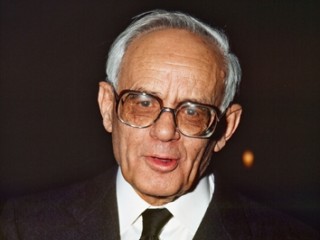
Karl Rahner biography
Date of birth : 1904-03-05
Date of death : 1984-03-30
Birthplace : Freiburg, Germany
Nationality : German
Category : Historian personalities
Last modified : 2011-10-10
Credited as : Theologian, Vatican Council , Roman Catholic thought
The German theologian Karl Rahner (1904-1984) was a major influence on 20th-century Roman Catholic thought. His work is characterized by the attempt to reinterpret traditional Roman Catholic theology in the light of modern philosophical thought.
Karl Rahner was born on March 5, 1904, in Freiburg im Breisgau in what is now the German Federal Republic. He followed his older brother Hugo into the Society of Jesus in 1922 and pursued the Jesuits' traditional course of studies in philosophy and theology in Germany, Austria, and Holland. He was ordained a priest in 1932 and continued his studies at the University of Freiburg. After receiving his doctorate in philosophy in 1936, he taught at the universities of Innsbruck and Munich. In 1967 he was appointed professor of dogmatic theology at the University of MÃnster. He was a peritus (official theologian) at the Second Vatican Council (1962-1965), and in 1969 he was one of 30 appointed by Pope Paul VI to evaluate theological developments since the Council.
Thomism, Kantianism, and contemporary phenomenology and existentialism are the three sources of Rahner's thought. During his early years of seminary training, he studied the works of Immanuel Kant and Joseph MarÃchal, along with the works of the great medieval theologian St. Thomas Aquinas. While at the University of Freiburg he came under the influence of Martin Heidegger. The overriding concern of all his work was the need to bring the best thought of the past into contact with the best thought of the present.
Often linked with Bernard Lonergan as a "transcendental Thomist," Rahner employed a method characterized by an attempt to discover the general principles underlying the various doctrines of the Roman Catholic faith. In his first work, Geist in Welt (1936; Spirit in the World), he presented his interpretation of Aquinas's doctrine of knowledge, indicating that man's capacity to know, although rooted in the data of the senses, is nonetheless a capacity open to the infinite or to being as such. This ability
to transcend particular being allows man to think metaphysically—to analyze the general structure of being necessary for the actual condition of the world known through the senses. Spirit in the World, in conjunction with Rahner's second major work, HÃrer des Wortes (1941; Hearers of the Word), established the epistemological and speculative foundation of his later thought.
Rahner's thought is best described as a theological anthropology. Beginning with the nature of man as a being open to the infinite, Rahner's thought sees a person's quest for fulfillment satisfied only in union with the God of Christian revelation, the God who became man in Jesus Christ. A proper understanding of humans cannot be divorced from an understanding of God and the context of relationships uniting humans and God. The fundamental fact underlying the existence of the world is that it stands in relation to God. Rahner calls this situation the supernatural existential and sees in this fundamental fact the root of all further explanations of sin, grace, and salvation. Rahner's vision of theology can also be understood through his work Foundations of Christian Faith: An Introduction to the Idea of Christianity (1976). While most religious scholars see Rahner as one of the most influential theologians of the 20th century, he also encountered critics along the way. Some within the Catholic Church found his writings too radical—in the early 1960's, Rahner's writings could only be published after approval from the Jesuits in Rome.
In March of 1984, after a birthday celebration that also honored his scholarship, Rahner fell ill from exhaustion in Innsbruck, Austria. He did not recover and died on March 30. Rahner was buried at the Jesuit church of the Trinity in Innsbruck.
Rahner's own writings are difficult. His The Dynamic Element in the Church (trans. 1964) and Nature and Grace: Dilemmas in the Modern Church (trans. 1964) provide good starting points for the reader interested in sampling his work. Patrick Granfield, Theologians at Work (1967), has an interesting interview with Rahner. The best study of Rahner in English is Louis Roberts, The Achievement of Karl Rahner (1967). Rahner's ideas are presented in a simplified form in Donald Gelpi, Life and Light: A Guide to the Theology of Karl Rahner (1966). Jakob Laubach's chapter on Rahner in Leonard Reinisch, ed., Theologians of Our Time: Karl Barth and Others (trans. 1964), provides a brief introduction to his thought. Sylvester Paul Schilling, Contemporary Continental Theologians (1966), has a critique of Rahner's work.
(Dych, William) Karl Rahner Liturgical Press, 1992.
(Kelly, Geffrey, ed.) Karl Rahner: Theologian of the Graced Search for Meaning Fortress Press, 1992.
The Christian Century (April 11, 1984).
Commonweal (April 20, 1984). □
















